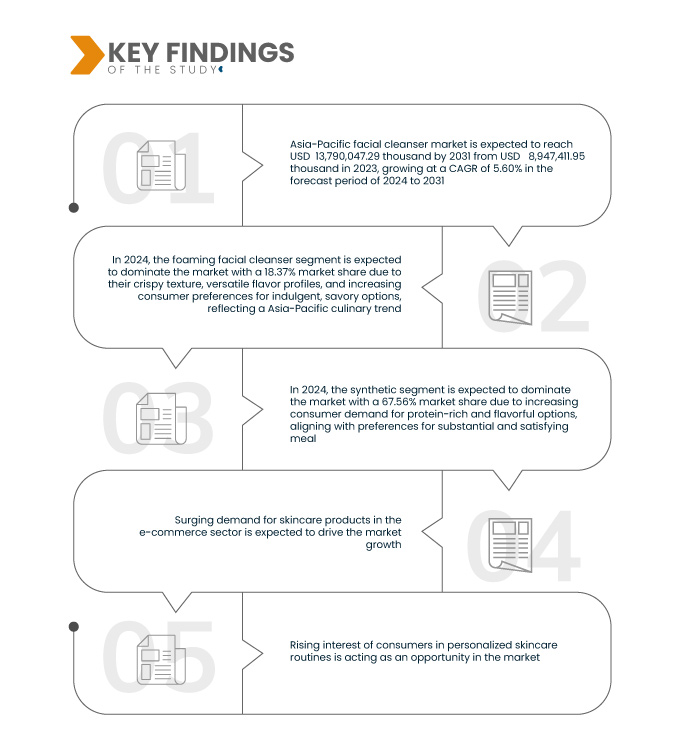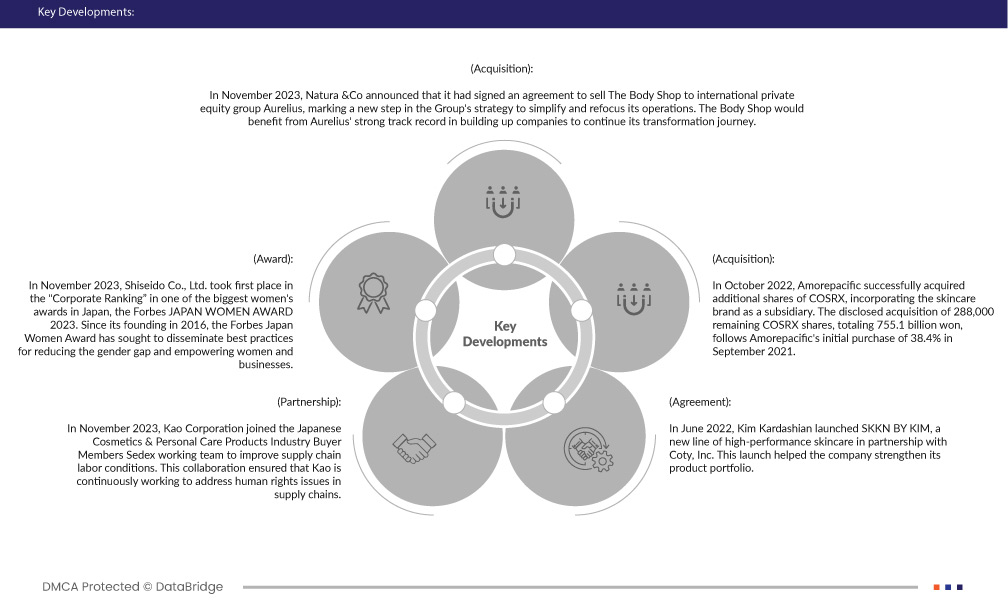L’influence toujours croissante des plateformes de commerce électronique a remodelé les habitudes des consommateurs et a profondément impacté l’industrie de la beauté et des soins de la peau. Cette tendance est motivée par le pouvoir transformateur de la vente au détail en ligne dans le domaine des soins de la peau. Le marché des nettoyants pour le visage en Asie-Pacifique a connu un essor remarquable, largement tiré par la croissance exponentielle du marché. secteur du commerce électronique. La commodité, la vaste gamme de produits et les expériences d'achat personnalisées offertes par les plateformes en ligne ont remodelé les comportements des consommateurs et ont profondément impacté l'industrie des soins de la peau.
La commodité, la portée de l’Asie-Pacifique et l’influence des plateformes en ligne remodèlent les comportements et les préférences des consommateurs pour les marques de soins de la peau. Le marché des nettoyants pour le visage en Asie-Pacifique est marqué par une concurrence intense motivée par des facteurs tels que l'évolution des préférences des consommateurs, l'émergence de marques indépendantes, les tendances en matière de soins de la peau personnalisés, luxe les entrées de marque et l'innovation continue des produits. En conséquence, les consommateurs se voient proposer un large éventail de choix et les marques sont obligées de se différencier grâce à des formulations uniques, des stratégies marketing et une concentration sur la durabilité pour acquérir un avantage concurrentiel sur ce marché dynamique. Ainsi, l’essor du marché des soins de la peau provenant du secteur du commerce électronique constitue un puissant moteur de croissance du marché.
Accéder au rapport complet @https://www.databridgemarketresearch.com/reports/asia-pacific-facial-cleanser-market
Data Bridge Market Research analyse que le Marché des nettoyants pour le visage en Asie-Pacifique devrait croître avec un TCAC de 5,60 % de 2024 à 2031 et devrait atteindre 13 790 047,29 milliers de dollars d’ici 2031.
Principales conclusions de l'étude
La demande croissante de produits biologiques et naturels devrait stimuler la croissance du marché
Le marché des nettoyants pour le visage en Asie-Pacifique connaît une croissance significative alors que les consommateurs accordent de plus en plus la priorité organique et produits naturels pour les soins de la peau. Ces dernières années, les consommateurs sont devenus de plus en plus conscients des ingrédients contenus dans leurs produits de soins de la peau, alimentant une évolution significative vers des choix plus propres et plus écologiques. Cette tendance est soutenue par une compréhension croissante des avantages potentiels des formulations biologiques et naturelles.
Les consommateurs sont particulièrement attirés par les produits sûrs, respectueux de l’environnement et emballés de manière durable. Les détaillants mettent en avant les produits de soins de la peau biologiques et naturels à mesure que le marché se développe en Asie-Pacifique, avec un abandon notable des alternatives formulées chimiquement. Les perspectives d'avenir du marché des soins de la peau biologiques sont optimistes, tirées par des facteurs tels que la sensibilisation croissante des consommateurs, l'augmentation des revenus disponibles, l'évolution des modes de vie, les préoccupations environnementales et l'accent croissant mis sur la durabilité. L'industrie est prête pour une croissance prometteuse, alimentée par l'éducation, la sensibilisation. , une population millénaire croissante et la présence croissante de femmes qui travaillent.
Ce changement impulsé par les consommateurs reflète non seulement un désir de soins de la peau efficaces, mais reflète également un engagement plus large en faveur de santé, la durabilité et les choix éthiques dans les routines de soins personnels. Les marques de soins de la peau qui adoptent cette tendance sont bien placées pour prospérer sur un marché où conscience et choix se croisent. Ainsi, la notoriété croissante des produits biologiques et naturels stimule la croissance du marché.
Portée du rapport et segmentation du marché
|
Mesure du rapport
|
Détails
|
|
Période de prévision
|
2024 à 2031
|
|
Année de référence
|
2023
|
|
Années historiques
|
2022 (personnalisable jusqu'en 2016-2021)
|
|
Unités quantitatives
|
Chiffre d'affaires en milliers d'USD
|
|
Segments couverts
|
Type (nettoyant moussant pour le visage, gel nettoyant pour le visage, crème et lotion nettoyantes pour le visage, nettoyant pour le visage à l'huile, nettoyant sans mousse, eau micellaire, nettoyant pour le visage en barre, nettoyant pour le visage au solvant, nettoyant de type collagène, tampons de coton nettoyants et autres), source (synthétique et naturel/à base de plantes), type d'emballage (bouteilles et pots, tubes, distributeurs, pochettes, blisters et bandes, et autres), type de peau (peau mixte, peau grasse, peau neutre, peau sèche, peau sensible, peau mixte et Autres), application (hydratation, blanchiment de la peau, onctuosité, anti-âge, points noirs, taches brunes, réparation, sécheresse et autres), fourchette de prix (masse et premium), tranche d'âge (20 et 30 ans, 40 ans, moins de 20 ans). , et 50 ans et plus), coût (moins de 25 USD, 25 – 50 USD, 51 – 100 USD, 101 – 250 USD et plus de 250 USD), client cible (femmes et hommes), utilisation finale (ménage/vente au détail, salon , agences de mannequins et de mode, films et divertissements, maisons de médias et autres), canal de distribution (hors ligne et en ligne)
|
|
Pays couverts
|
Chine, Japon, Corée du Sud, Inde, Australie, Indonésie, Singapour, Taïwan, Thaïlande, Malaisie, Philippines, Vietnam, Nouvelle-Zélande et reste de l'Asie-Pacifique
|
|
Acteurs du marché couverts
|
Unilever (Royaume-Uni), Procter & Gamble (États-Unis), L'Oréal Paris (France), Estée Lauder Inc (États-Unis), Shiseido Co.,Ltd. (Japon), Johnson & Johnson Consumer Inc. (États-Unis), Amorepacific (Corée du Sud), Kao Corporation (Japon), Groupe L'OCCITANE (Suisse), Sephora USA, Inc. (États-Unis), Coty Inc. (France), Clarins (États-Unis), Caudalie (France), Natura&Co (Brésil) et Beiersdorf AG (Allemagne), entre autres
|
|
Points de données couverts dans le rapport
|
En plus des informations sur les scénarios de marché tels que la valeur du marché, le taux de croissance, la segmentation, la couverture géographique et les principaux acteurs, les rapports de marché organisés par Data Bridge Market Research comprennent également une analyse approfondie d'experts, une production géographiquement représentée par l'entreprise et capacité, configuration du réseau de distributeurs et de partenaires, analyse détaillée et mise à jour des tendances des prix et analyse des déficits de la chaîne d'approvisionnement et de la demande
|
Analyse sectorielle
Le marché des nettoyants pour le visage en Asie-Pacifique est segmenté en onze segments en fonction du type de produit, de la source, du type d’emballage, du type de peau, de l’application, de la fourchette de prix, de la tranche d’âge, du coût, du client cible, de l’utilisation finale et du canal de distribution.
- Sur la base du type de produit, le marché est segmenté en nettoyant pour le visage moussant, nettoyant pour le visage en gel, nettoyant pour le visage en crème et lotion, nettoyant pour le visage à l'huile, nettoyant sans mousse, eau micellaire, nettoyant pour le visage en barre, nettoyant pour le visage à base de solvant, nettoyant de type collagène, nettoyant pour le visage. tampons de coton et autres
En 2024, le segment des nettoyants moussants pour le visage devrait dominer le marché des nettoyants pour le visage en Asie-Pacifique.
En 2024, le segment des nettoyants moussants pour le visage devrait dominer le marché avec 18,37 % de part de marché en raison de leur texture croustillante, de leurs profils de saveurs polyvalents et des préférences croissantes des consommateurs pour des options gourmandes et salées, reflétant une tendance culinaire de l'Asie-Pacifique.
- Sur la base de la source, le marché est segmenté en synthétiques et naturels/à base de plantes.
En 2024, le segment synthétique devrait dominer le marché des nettoyants pour le visage en Asie-Pacifique.
En 2024, le segment synthétique devrait dominer le marché avec une part de marché de 67,56 % en raison de la demande croissante des consommateurs pour des options riches en protéines et savoureuses, correspondant aux préférences pour des repas substantiels et satisfaisants.
- Sur la base du type d’emballage, le marché est segmenté en bouteilles et pots, tubes, distributeurs, sachets, blisters et packs de bandes, et autres. En 2024, le segment des bouteilles et pots devrait dominer le marché avec une part de marché de 38,11 %.
- Sur la base du type de peau, le marché est segmenté en peaux mixtes, peaux grasses, peaux neutres, peaux sèches, peaux sensibles, peaux mixtes et autres. En 2024, le segment des peaux mixtes devrait dominer le marché avec une part de marché de 28,33 %.
- Sur la base de l’application, le marché est segmenté en hydratation, blanchiment de la peau, onctuosité, anti-âge, points noirs, taches brunes, réparation, sécheresse et autres. En 2024, le segment hydratant devrait dominer le marché avec une part de marché de 21,18 %
- Sur la base de la fourchette de prix, le marché est segmenté en masse et premium. En 2024, le segment de masse devrait dominer le marché avec une part de marché de 76,93 %
- Sur la base de la tranche d'âge, le marché est segmenté en 20 et 30 ans, 40 ans, moins de 20 ans et 50 ans et plus. En 2024, le segment des 20 et 30 ans devrait dominer le marché avec une part de marché de 43,85 %.
- Sur la base du coût, le marché est segmenté en moins de 25 USD, 25 à 50 USD, 51 à 100 USD, 101 à 250 USD et plus de 250 USD. En 2024, le segment de moins de 25 USD devrait dominer le marché avec une part de marché de 60,95 %.
- Sur la base de la clientèle cible, le marché est segmenté en femmes et hommes. En 2024, le segment féminin devrait dominer le marché avec une part de marché de 76,19 %.
- Sur la base de l’utilisation finale, le marché est segmenté en ménages/vente au détail, salons, agences de mannequins et de mode, films et divertissements, maisons de médias et autres. En 2024, le segment des ménages/commerce de détail devrait dominer le marché avec une part de marché de 51,15 %.
- Sur la base du canal de distribution, le marché est segmenté en hors ligne et en ligne. En 2024, le segment hors ligne devrait dominer le marché avec une part de marché de 82,04 %.
Acteurs majeurs
Data Bridge Market Research analyse Unilever (Royaume-Uni), Procter & Gamble (États-Unis), L'Oréal Paris (France), Estée Lauder Inc (États-Unis), Shiseido Co., Ltd. (Japon) comme les principales entreprises de la région Asie-Pacifique. marché des nettoyants.
Développements du marché
- En novembre 2023, Natura &Co a annoncé avoir signé un accord pour céder The Body Shop au groupe international de capital-investissement Aurelius, marquant une nouvelle étape dans la stratégie du Groupe visant à simplifier et recentrer ses opérations. The Body Shop bénéficierait de la solide expérience d'Aurelius en matière de création d'entreprises pour poursuivre son parcours de transformation.
- En novembre 2023, Shiseido Co.,Ltd. a remporté la première place du « Classement des entreprises » dans l'un des plus grands prix féminins au Japon, le Forbes JAPAN WOMEN AWARD 2023. Depuis sa création en 2016, le Forbes Japan Women Award vise à diffuser les meilleures pratiques pour réduire l'écart entre les sexes et autonomiser. les femmes et les entreprises, ce qui a permis à l’entreprise de démontrer ses efforts au niveau de l’Asie-Pacifique.
- En octobre 2023, Amorepacific a acquis avec succès des actions supplémentaires de COSRX, intégrant la marque de soins de la peau en tant que filiale. L'acquisition divulguée des 288 000 actions COSRX restantes, pour un total de 755,1 milliards de won, fait suite à l'achat initial de 38,4 % par Amorepacific en septembre 2021. Cette décision porte la participation d'Amorepacific à 93,2 % des actions COSRX. Amorepacific vise à utiliser les atouts de COSRX et à intégrer sa vision d'une expansion future en Asie-Pacifique.
Analyse régionale
Géographiquement, les régions couvertes par le rapport sur le marché des nettoyants pour le visage en Asie-Pacifique sont la Chine, le Japon, la Corée du Sud, l’Inde, l’Australie, l’Indonésie, Singapour, Taiwan, la Thaïlande, la Malaisie, les Philippines, le Vietnam, la Nouvelle-Zélande et le reste de l’Asie-Pacifique.
Pour des informations plus détaillées sur le rapport sur le marché des nettoyants pour le visage en Asie-Pacifique, cliquez ici –https://www.databridgemarketresearch.com/reports/asia-pacific-facial-cleanser-market














